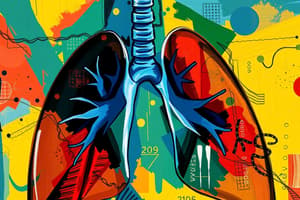Podcast
Questions and Answers
What is the maximum amount of air that can be forcefully exhaled after a normal or resting expiration?
What is the maximum amount of air that can be forcefully exhaled after a normal or resting expiration?
- 3.5 L
- 1.2 L (correct)
- 2.5 L
- 4.7 L
What is the volume of air that can be exhaled from the lungs after a maximum inspiration?
What is the volume of air that can be exhaled from the lungs after a maximum inspiration?
- 4.7 L (correct)
- 3.5 L
- 5.5 L
- 1.2 L
What is the amount of air that the lung can hold after normal expiration?
What is the amount of air that the lung can hold after normal expiration?
- 2.5 L
- 4.7 L
- 3.5 L (correct)
- 1.2 L
What is the volume of air remaining in the lungs after a forceful expiration?
What is the volume of air remaining in the lungs after a forceful expiration?
What is the equation for Vital Capacity (VC)?
What is the equation for Vital Capacity (VC)?
What is the volume of air remaining in the lungs after normal expiration?
What is the volume of air remaining in the lungs after normal expiration?
What is the relationship between Inspiratory Capacity (IC) and Tidal Volume (TV)?
What is the relationship between Inspiratory Capacity (IC) and Tidal Volume (TV)?
What is the difference between Expiratory Reserve Volume (ERV) and Residual Volume (RV)?
What is the difference between Expiratory Reserve Volume (ERV) and Residual Volume (RV)?
What is the total lung capacity (TLC) equal to?
What is the total lung capacity (TLC) equal to?
What is the maximum volume of air that can be exhaled slowly after slow maximum inhalation?
What is the maximum volume of air that can be exhaled slowly after slow maximum inhalation?
What is the largest volume of air that can be breathed out of the lungs in 1 minute?
What is the largest volume of air that can be breathed out of the lungs in 1 minute?
What is the volume of expired air in liters per minute measured over a minimum of one minute while breathing normally?
What is the volume of expired air in liters per minute measured over a minimum of one minute while breathing normally?
What is the majority of FVC exhaled in?
What is the majority of FVC exhaled in?
What is the respiratory rate multiplied by in the formula for minute ventilation?
What is the respiratory rate multiplied by in the formula for minute ventilation?
What is the purpose of dynamic lung tests?
What is the purpose of dynamic lung tests?
What is the name of the test that measures the total volume of air that can be exhaled forcefully and rapidly after maximum inhalation?
What is the name of the test that measures the total volume of air that can be exhaled forcefully and rapidly after maximum inhalation?
What is the primary function of pulmonary function tests?
What is the primary function of pulmonary function tests?
What is spirometry?
What is spirometry?
What is measured by spirometry?
What is measured by spirometry?
What is the difference between lung volumes and capacities?
What is the difference between lung volumes and capacities?
What is the Inspiratory Reserve Volume (IRV)?
What is the Inspiratory Reserve Volume (IRV)?
What is the Tidal Volume (TV)?
What is the Tidal Volume (TV)?
How many static lung volumes are there?
How many static lung volumes are there?
What is the total lung capacity?
What is the total lung capacity?
Flashcards are hidden until you start studying
Study Notes
Pulmonary Function Tests
- Pulmonary function tests measure how well the lungs take in and release air.
- Spirometry is the most common type of pulmonary function test.
Lung Volumes and Capacities
- Lung volumes are divided into 4 defined volumes and 4 capacities.
- Volumes are integral units, whereas capacities consist of 2 or more volumes.
- Static lung volumes do not depend on the rate at which air flows.
Lung Volumes
- Tidal Volume (TV): volume of air inspired or expired during normal quiet breathing (0.5L).
- Inspiratory Reserve Volume (IRV): maximum amount of air that can be forcefully inspired after a normal tidal volume (3L).
- Expiratory Reserve Volume (ERV): maximum amount of air that can be forcefully expired after a normal or resting expiration (1.2L).
- Residual Volume (RV): volume of air remaining in the lungs after a forceful expiration (1.2L).
Lung Capacities
- Vital Capacity (VC): volume of air that can be exhaled from the lungs after a maximum inspiration (VC = IRV + TV + ERV = 4.7L).
- Inspiratory Capacity (IC): amount of air that the lung can hold after normal expiration (IC = IRV + TV = 3.5L).
- Functional Residual Capacity (FRC): volume of air remaining in the lungs after normal expiration (FRC = ERV + RV = 2.4L).
- Total Lung Capacity (TLC): volume of air in the lungs after a maximum inspiration (TLC = IRV + TV + ERV + RV = 5.9L).
Spirometry Tests
- Forced Vital Capacity (FVC): total volume of air that can be exhaled forcefully and rapidly after maximum inhalation.
- Slow Vital Capacity (SVC): maximum volume of air that can be exhaled slowly after slow maximum inhalation.
- Maximum Voluntary Ventilation (MVV): largest volume of air that can be breathed out of the lungs in 1 minute.
- Minute Ventilation (MV): volume of expired air in liters per minute measured over a minimum of one minute while breathing normally (MV = respiratory rate x tidal volume).
Studying That Suits You
Use AI to generate personalized quizzes and flashcards to suit your learning preferences.



